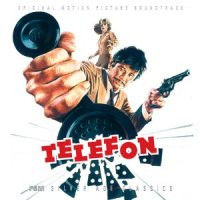- Telefon composed by Lalo Schifrin
- Hide in Plain Sight composed by Leonard Rosenman
- Film Score Monthly / 2011 / 38:34 + 22:01
I’ve been reviewing film music for almost 15 years. On this website (and its past incarnations), a couple of others and a variety of magazines, I reckon I’ve probably reviewed somewhere between 2,000 and 3,000 soundtrack albums – quite possibly more than anyone else alive, and if not then it can’t be far behind. I am well aware that some people have been reading my reviews from the start. To those people, I offer my profound thanks and profuse apologies. One thing that, I believe, should be evident to anyone who has been “with me” for a while is the degree of research I put into these things. Sometimes I have been known to spend literally several minutes researching my reviews. I believe this enables me to offer rare degrees of insight and to pass on key pieces of information which others may miss. A key example comes with Telefon – I can now reveal, saving you all the bother of doing your own research, that this word translates as “telephone”.
The film is a Cold War thriller starring Charles Bronson as a KGB agent looking to stop a rogue agent looking to start WWIII and also evade being captured and killed himself while on American soil. Directed by Don Siegel, it’s an enjoyable film – not the thrill-a-minute type of film which may be expected by modern audiences, and there’s a really refreshing feel to its more modest pace. Siegel worked with some great film composers in his time (Elmer Bernstein, Ennio Morricone and Jerry Fielding amongst them) – this was his third collaboration with Lalo Schifrin in the 1970s (after Dirty Harry and Charley Varrick) and Schifrin’s taut, tense music plays a key role in the film’s success.
Melody is not the score’s main ingredient, but there’s still a great theme over the main titles, a Russian-flavoured piece performed on the cimbalom which the composer weaves subtly through his score. The most overt thematic statement is saved for the end titles, a lovely waltz. In between is mostly suspense music – Schifrin builds on small motifs, generating impressive tension from gradual development of these pieces, only occasionally offering full-blooded action music. It may not sound that promising from my description (15 years on and still I don’t even know how to convey the basic feeling of the music) but it works surprisingly well on the album. I think it’s a thoroughly impressive effort, maybe not quite top-drawer Schifrin but it will be a very welcome release for his fans.
The disc’s second score is a brief one from Leonard Rosenman, composed for James Caan’s only film as director, Hide in Plain Sight. I must admit I’d never even heard of the film before this release – it’s based on an astonishing-sounding story about a man’s desperate search for his two children, who have been hidden away in the witness protection programme with their mother and her new husband and the government won’t even tell him where they are. Caan didn’t want any music at all in his film but the studio insisted; of the music Rosenman did record, only two score tracks were actually used in the film, plus two source cues.
Those source cues open the presentation of the score on the album and are actually very enjoyable (new cues which were inserted into clips of first The Untouchables and then Flipper being watched on-screen – I bet Leonard Rosenman never imagined he’d end up scoring Flipper!) The score itself is typical Rosenman – dense brass writing combining with low-end winds for some frentic, frenetic thrills amongst more melodious material filled with all sorts of emotion, but primarily anguish.
It’s a fantastic little score. From the powerful tension of “Followed on the Freeway” to the extremely moving “Finale”, it’s just top-notch film music, a gem of a score. Two fine scores are on this FSM album, which I highly recommend. They don’t have anything in common apart from being good, but I guess Rosenman’s was considered too brief to release by itself and needed a companion of some sort. As usual, FSM’s production values are very fine – but the main reason for buying the album is to hear two of film music’s most intelligent craftsmen simply doing their thing. ****














Hey, James, you know I am one of your regular readers! One of the things that I appreciate the most is your sense of humour. The ending of that first paragraph just cracked me up. If Monty Python were still around, you might consider applying… Regards.
Ha! Not interested in this score (not my thing), but your sense of humor and engaging writing always makes me read every review you post. I’ve been enjoying your website for years- keep up the great work!
For a second there I thought you wrote malodious as in malodorous and not melodious. An evil sounding note maybe? Anyway whats frentic these days?
Surely you know what frentic is!